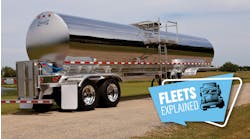Touting her background in using data to regulate transportation and the overall importance of the trucking industry for America, Meera Joshi appeared before the Senate Committee on Commerce, Science, and Transportation on Sept. 22 as it considers her nomination to lead the Federal Motor Carrier Safety Administration.
Joshi, who joined other Department of Transportation nominees in the committee’s Russell Senate Office Building hearing room, shared her views on regulating the trucking industry, shortening detention times for drivers, roadway safety, and how technology will play a more significant role in how the FMCSA approaches self-driving vehicles, and more artificial intelligence in trucks. Joshi, currently the deputy administrator of the FMCSA, has been the acting head of the agency—the Department of Transportation’s interstate trucking and busing regulatory arm—since President Biden took office in January.
During the Trump Administration, the FMCSA finalized the implementation of electronic logging devices (ELD), enacted new hours of service regulations, and saw the trucking industry move to the front of national consciousness during the COVID-19 pandemic. That all happened while the agency only had one Senate-confirmed administrator during Trump’s presidency. Since Raymond Martinez stepped down as the head of the FMCSA in 2019, Joshi is the third deputy administrator to act as head of the administration. Martinez was confirmed as head of the FMCSA more than a year into Trump’s term. He stayed in the job for 20 months before stepping down.
With more than 500,000 interstate carriers and 4.7 million commercial driver's license (CDL) holders across the nation, the FMCSA and its 1,100 employees have overseen significant changes for drivers and carriers over the past five years.
Joshi has the backing of the American Trucking Associations. “Throughout Ms. Joshi’s tenure as deputy administrator, we have been particularly impressed by her reliance on data to address real-world needs,” Chris Spear, ATA president and CEO, wrote to the Senate committee in September. “As a testament to FMCSA’s paramount mission of safety, Deputy Administrator Joshi immediately engaged motor carriers, drivers, and other stakeholders across the trucking industry to ensure that we could continue safely serving American businesses and families despite an unprecedented global pandemic, natural disasters, cyberattacks on pipelines, and a workforce in need of support and growth. Her engagement has been candid, collaborative, and valuable.”
During her opening statement, Joshi praised the work of the trucking industry during times of crisis, such as the ongoing COVID-19 pandemic and other incidents, such as the recent Hurricane Ida and Colonial Pipeline cyberattack, which affected fuel availability across much of the Eastern Seaboard.
“Commercial motor vehicles, aka large trucks and buses, are not only essential to America's thriving economy—transporting over 70% of our nation's freight as well as our loved ones— they're critical in crisis,” Joshi said. “Throughout COVID, the trucking industry has been at the forefront moving vaccines, testing supplies, and oxygen. When the Colonial Pipeline was breached, tank trucks transported gas to stations and ultimately into Americans’ cars. Most recently, during Hurricane Ida, large trucks brought emergency supplies to our hardest-hit regions.”
Here’s a look at some of the other topics senators and Joshi discussed during the hearing on Sept. 22. Some of the quotes are slightly edited for clarity.
Infrastructure
The nominee touted the Infrastructure Investment and Jobs Act, the bipartisan infrastructure bill passed by the Senate this summer that still needs House approval. She said that bill would increase funding for “FMCSA state partners to hire additional personnel for roadside inspections and reach the true breadth of the vast commercial motor vehicle industry. It provides FMCSA and states the opportunity to increase investigative and enforcement resources focused on high-risk motor carriers and in high crash zones. It supports essential upgrades to states' IT infrastructure to improve critical commercial motor vehicle driver data collection and transfer and allows for the integration of safety technology in commercial motor vehicle fleets.”
While Joshi has no specific trucking background, the Biden Administration is touting her more than 15 years’ experience in government oversight. Before taking over the city’s transportation regulation, Joshi was the inspector general for the New York City Department of Corrections. In that role, she was responsible for investigating corruption and criminality at all city jail operations.
Carrier and safety regulations
In her opening statement, Joshi addressed roadway fatalities involving heavy-duty vehicles: “Sadly, since 2009, commercial motor vehicle-related roadway fatalities in the United States have steadily risen, resulting in the loss of thousands of lives of men, women, and children. And every year, over 800 of these victims are large truck or bus drivers. I'm deeply committed to the undisputed work ahead, reversing this fatal trend. Ensuring the safety of the women and men that (are) literally driving the commercial motor vehicle industry and all those they share the road with is my personal and utmost priority.”
Noting this increase in fatal crashes involving heavy-duty vehicles over the past decade, Sen. Ed Markey (D-Massachusetts) said his calls for more oversight of trucking were ignored in recent years.
“I wrote a letter to the FMCSA that urged the agency to implement stronger procedures for certifying new trucking companies, conducting regular oversight of the industry, and enforcing federal safety standards,” he said. “Unfortunately, the response I received back from the Trump administration was woefully insufficient. It failed to commit to the major reforms we need and showed how truck safety regulators have been asleep at the wheel.”
Markey said the Biden administration had to do a better job to address safety and asked what Joshi would do as head of the FMCSA to oversee the trucking industry.
Joshi laid out some of her priorities for FMCSA regarding safety and regulations:
“No. 1, it's an interstate industry and the licensing data around those that drive large trucks must also function in an interstate manner. That means there needs to be swift and current data transfer between states around CDL licensure. This is a rulemaking that we are in the final months of getting published. It would mandate that states electronically transfer this data, and we would like to also accelerate adoption of this new rulemaking through grantmaking and other incentives.”
“Our Drug and Alcohol Clearinghouse, which the FMCSA staff work tirelessly to stand up, has been essential to identifying risky drag drivers pre-employment. The rulemaking that's forthcoming will also require states to downgrade licenses if there is a positive in the Drug and Alcohol Clearinghouse. Another important enforcement tool to get risky drivers off the roads.”
“We're also committed to strengthening our new entrant program. Motor carriers that have risky behavior need to be investigated. And when they come newly into the industry, we need to have a closer eye on them.”
“Finally, broaden the scope of those motor carriers that we do investigations of to encompass more at-risk behavior.”
Noting the impact the trucking industry and ports have on the economy in his state, Sen. Dan Sullivan (R-Alaska) asked Joshi about stakeholder engagement in regulatory decisions. “You have to balance things with regulations,” Sullivan said. “You want to make sure this is a really robust employment and job sector. Can I get your commitment to work with stakeholders, the men and women who drive the trucks—whether its Teamsters or others—and the industry?”
Joshi: “You have my commitment. I also firmly believe that's the only way we can make solid regulations. So I've had the pleasure of visiting New York-New Jersey port and meeting with several port operators, motor carriers, and plan to meet with drivers groups that also work at ports and extend that invitation to Alaska as well. But we absolutely cannot make informed policy decisions without driver and motor carrier input.”
Distracted driving
Joshi was asked, in general, about distracted driving on the roadways, which is enforced differently in each state. She focused on her history in New York City, which has some of the country’s most strict distracted driving laws.
Joshi: “It's one of the most heartbreaking incidents because it's preventable. It takes a quick decision not to use your phone while you're driving to put on the return text message that says, do not disturb me, I'm driving, I will not respond. It's those slight changes that make huge differences. In New York City, we have a complete ban on the use of cell phones—even with the earpiece for professional drivers. But our work at FMCSA is really focused on outreach and working with state partners. And I applaud every effort of every state to increase those penalties and laws, the effectiveness of them to really change the culture around even having any acceptability of using a cell phone while driving.”
Trucking and AI
Joshi on evolving technologies in trucking, such as artificial intelligence (AI) and autonomous vehicles (AV):
“We are in indeed, in a time of incredible transition within the industry. The transition from mechanical to AI occurs, but for FMCSA, the mission of safety as the No. 1 priority stays the same. Our challenge is to ensure that our regulations to uphold roadway safety translate into an AI world. The principles remain the same. And we're embarking on that work now to stand up a regulatory framework for AV trucking so that safety is No. 1... The crash prevention technology that AI brings can benefit road users, and there are accountability measures, so we understand critical things in an automated world. Like when does a crash occur? When is there a disengagement? There are questions that are new for the industry to have to answer in the AI world. And we intend to work closely with stakeholders to find the right way to make sure those accountability measures are in place.”
Supply chain
Sen.Deb Fischer (R-Nebraska) talked about the “extreme freight backlog” across the country and its toll on businesses. She asked Joshi what FMCSA could do, beyond recent HOS waivers, to help alleviate it.
Joshi: “These are certainly unprecedented times when it comes to freight transportation. One action that we recently took is we added to the most recent extension of the hours of service exemptions… where motor carriers using those exemptions will provide to us some more detail about how they're using them. In gathering that information. I think it'll be able to help us formulate whether there are longer-term and more narrowly tailored solutions that we can put in place given the freight constraints that our nation is currently experiencing.”
Earlier in the hearing, Joshi discussed decreasing driver detention time, particularly unpaid detentions. She mentioned “creating the financial incentives for shippers and port operators to decrease that time so that that financial burden doesn't fall on truckers and it creates a better throat throughput is essential, I believe, to increasing the throughput for truckers at the ports.”
Under 21 drivers (DRIVE-Safe Act)
Under current federal and state trucking regulations, Fischer noted that a 20-year-old truck driver could drive a tractor 517 miles from Omaha in eastern Nebraska to Harrison on the other side of the state. “However, that same driver cannot drive four-and-a-half miles from Omaha across the bridge into Council Bluffs, Iowa,” Fischer said.
The Senate’s infrastructure bill (which still has not passed the House) would establish a pilot program for the FMCSA to allow 18 to 21-year-old drivers to participate in interstate commerce apprenticeship programs. Fischer asked Joshi if she supports the initiative, known as the DRIVE-Safe Act.
Joshi: “This is a topic that has come up very frequently with regards to driver retention and the driver capacity. So we are absolutely committed to following the letter of the law. I want to note several important provisions: One, they have to have a CDL license to begin with. There's an hours requirement, which is important. And there's a safeguard within the legislation—if there are any safety concerns—for termination. And finally, it requires us to do a very important study on driver compensation, more broadly, including paid and unpaid detention time.”
Livestock hauling
Joshi: “I've had the pleasure of meeting with several livestock trade associations and have made a commitment, which I think will be really important to my role, which is to go and watch what it takes to load and unload a truck with livestock. It is absolutely a different commodity than say paper towels. There's so much more sensitivity involved. We must be flexible. We must be understanding of the businesses we regulate. And I commit to working with you and the agricultural and livestock industry to make sure that our rules don't undermine safety, but allow them to operate.”
Human trafficking
Asked about human trafficking and how the trucking industry can work to curtail it in the U.S., Joshi cited two ways that FMCSA can assist in this:
“One is making sure that our inspectors and the inspectors with our state partners are aware of the signs of human trafficking and so that they are on the lookout for that when they do their roadway work. Second is the education and outreach that goes to truckers directly. Our emphasis on that outreach, as well as our safety outreach, is to understand how are we best communicating? Are we using the best measures? Is our message getting across? And are we giving them information at locations and in modes that makes it receptive to the audience? We need to make sure that our outreach is effective.
Joshi's past experience
An attorney, Joshi is a past chairwoman and CEO of the New York City Taxi & Limousine Commission, the nation’s largest for-hire transportation regulator. While in that role, she led the Vision Zero campaigns that used tracking technology to keep high-risk drivers and unsafe vehicles off city roads. She also led a policy that included establishing open transportation data standards for rideshare app-based providers, enacting the nation’s first for-hire driver pay protection program, and providing broad access to for-hire transportation for passengers who use wheelchairs, according to a bio provided by the Biden Administration.
The Vision Zero campaign, Joshi said during the hearing, set roadway rules for more than 150,000 professional taxi and for-hire drivers. “I witnessed firsthand the pain of families who lost loved ones to traffic violence and ensured that all new drivers knew their names and knew the names of those that they had lost,” Joshi said during her opening statement. “It was also important to me to publicly acknowledge the city's highly skilled professional drivers—women and men, who year after year safely transported passengers through congested streets. I led pilots to integrate innovative vehicle safety technology. I increased the effectiveness of roadway enforcement and inspections and I used data analytics to identify and remove the most dangerous drivers from the road and operators from the industry.”
Joshi went on to say she did this by working with large and small operators, technology companies, safety and labor advocates, elected officials, and the public. “The result of these productive relationships was balanced policy that raises safety and accountability standards for all,” she said. “This experience is the source of my desire and belief that I can make a positive difference nationwide in roadway safety as administrator of the FMCSA.”
What’s next for nominees
Joshi joined three other presidential nominees for DOT posts appearing before the Senate committee: Victoria Marie Baecher Wassmer, DOT chief financial officer nominee; Mohsin Raza Syed, DOT assistant secretary of government affairs nominee; and Amitabha Bose, Federal Railroad Administration administrator nominee.
Following the Sept. 22 hearing, senators have 72 hours to submit written questions to the nominees, who would have a week to respond, in writing, to the committee. After that, the committee could vote on the nominees, which would send them to the Senate floor for official confirmation.














